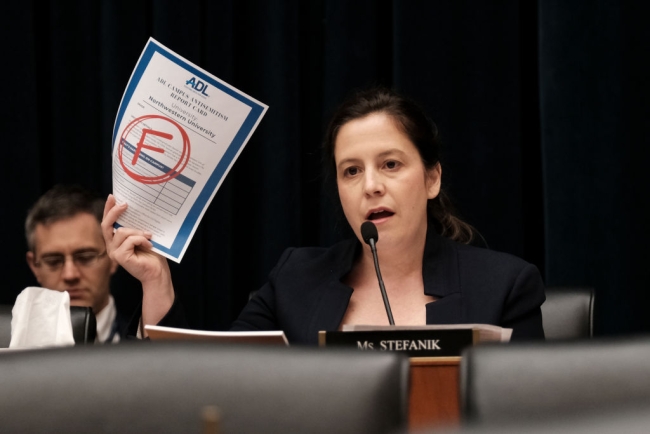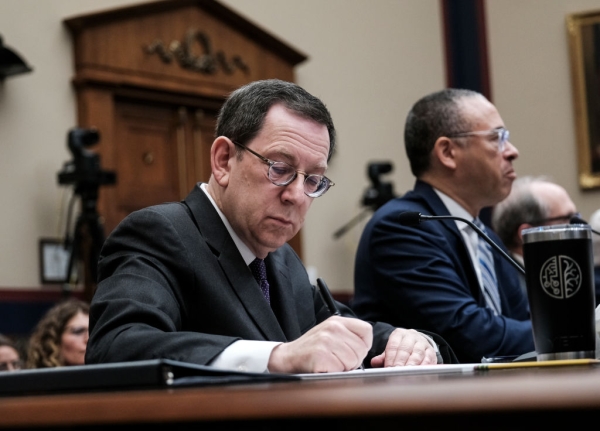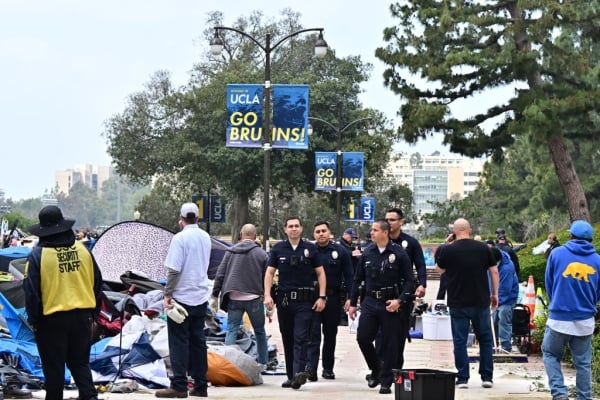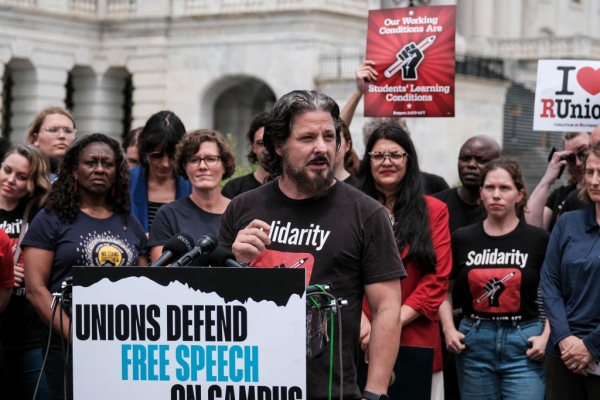You have /5 articles left.
Sign up for a free account or log in.

New York representative Elise Stefanik, a Republican, repeatedly questioned Northwestern president Michael Schill about his decision to negotiate with students who set up an encampment on campus to protest the war in Israel.
Photo by Michael A. McCoy/Getty Image
House Republicans spent a little over three hours Thursday admonishing the leaders of Northwestern University, Rutgers University and the University of California, Los Angeles for how they responded to antiwar protests and antisemitic incidents on their campuses, arguing they failed in their central obligation to protect students.
“Each of you should be ashamed of your decisions that allowed antisemitic encampments to endanger Jewish students,” said Representative Virginia Foxx, the North Carolina Republican who chairs the House Education and Workforce Committee, which held the hearing.
But for all their attempts, the lawmakers didn’t appear to land any knock-out punches in the third hearing focused on campus antisemitism, though the committee seems undeterred in expanding its oversight of colleges and universities. Unlike past hearings, which helped to bring down the presidents of Harvard University and the University of Pennsylvania, the university leaders appeared to survive their turn before the House education committee without making any clear missteps that could go viral on social media. But their answers—or lack thereof—did frustrate Republicans on the committee.
Lawmakers from both parties pressed the university leaders about whether students and faculty accused of antisemitism have faced discipline, whether Israel is a genocidal state, and how they plan to protect Jewish students in the coming academic year. Democrats pushed back, calling the hearing “politically bullying.” Outside the hearing room, faculty members from the three universities denounced the hearings as a “witch hunt.”
The university leaders appeared to benefit from the timing of Thursday’s session, which came only 37 days since the last higher antisemitism hearing. Held right before the holiday weekend, the hearing was the shortest of the higher ed campus antisemitism hearings thus far and lawmakers appeared more subdued. It also fell at the end of their institutions’ academic year. Rutgers already held its graduation ceremony, and UCLA and Northwestern will wrap up their spring terms next month.
Surviving the hearing is the first hurdle for the college leaders who will still have to answer for their testimony back on campus. What their reception will be is unclear, though UCLA students built a second encampment Thursday, replacing the one torn down by campus police earlier this month. Faculty at UCLA are also planning to walk off the job next week, joining faculty at the University of California campuses at Santa Cruz and Davis. They’re striking to protest a number of alleged unfair labor practices—including calling in the cops to crack down on student protesters.
Here’s what else you should know about Thursday’s hearing.
The Schill Show
The president of Northwestern, the only private university represented Thursday, received the brunt of the committee’s attention and criticism. But Schill generally gave as good as he got, challenging his inquisitors' premises and taking issue with their lines of questioning.
“I’m offended by you telling me what my views are,” Schill told Utah Representative Burgess Owens, a Republican.
Republicans and some Democrats honed in on the so-called Deering Meadow Agreement—the deal Schill struck with students protesting on the campus lawn. Protesters agreed to take down their tents and silence sound systems in exchange for scholarships for five Palestinian undergraduates and a gathering space for Middle Eastern, North African and Muslim students, among other provisions. Lawmakers asked whether those concessions violated federal anti-discrimination laws and pressed Schill to say whom he’d consulted with in making the decision. Why, for instance, didn’t he discuss it with his committee to prevent antisemitism? (In response to the agreement, seven members of that committee resigned.)

Northwestern president Michael Schill (left) and Rutgers president Jonathan Holloway testified at Thursday’s Congressional hearing on campus antisemitism, alongside UCLA chancellor Gene Block.
Michael A. McCoy/Getty Images
Schill defended and downplayed the deal, noting that he brought an end to the encampment without violence. He said the agreement was outside the antisemitism committee’s purview. “There’s a limit to how many people one can consult when one is talking with students around the clock,” he said.
The president also faced questions about individual faculty members supportive of the protests, and disciplinary behavior for those accused of assaulting and stalking Jewish students. Unlike Columbia President Minouche Shafik, who testified in April, he declined to discuss individual faculty members or to comment on the speech of students, faculty and staff.
Lawmakers said Schill’s responses were “embarrassing” and called on him to resign.
“I’m appalled by the condescension and contempt you have shown for the committee and toward your own Jewish students today,” Foxx said. “You’ve refused to answer basic questions on topic … You’ve given misleading answers that contradict the words of the agreement that you have signed.”
UCLA Avoids the Spotlight
In an unexpected twist, few lawmakers questioned UCLA chancellor Block about a recent clash between protesters and counterprotesters—one of the more violent episodes in the last month amid a nationwide wave of largely peaceful protests.
Students in support of Palestine set up an encampment on the campus April 25, which was then attacked by pro-Israel counterprotesters the night of April 30. Campus police didn’t immediately intervene as those agitators launched fireworks and other projectiles into the tent city. Students inside the encampment said they feared for their lives. A group of student journalists were also attacked.
UCLA did call in law enforcement the following day to clear the encampment. More than 200 people were arrested. Rutgers and Northwestern, to Republican lawmakers’ dismay, didn’t use police to end their encampments.

Police patrol the UCLA campus after the university cleared an encampment earlier this month.
Photo by FREDERIC J. BROWN/AFP via Getty Images
Representative Mark Takano, a California Democrat, was one of the few to directly question Block about the encampment, asking him if UCLA could have done anything different to prevent the violence.
“We tried very hard to find an off-ramp,” Block said, adding that attempts were made to talk with students and find potential solutions. In his opening remarks, Block said that he should have been prepared to immediately remove the encampment if safety was at risk.
Block faced the sharpest questions from Representative Ilhan Omar, a Minnesota Democrat, who has supported students protesting the war in Israel. The events at UCLA were “appalling” and could have been prevented, she said.
“If you are truly committed to keeping students safe, how did you fail these students at many critical points?” Omar said. “You should be ashamed for allowing such violence to take place.”
Are Republicans Losing Steam?
Republicans on the committee used more props and videos this time to drive home their contention that universities are hotbeds of antisemitism, unleashing righteous indignation to decry campus protests and dismiss the answers of the witnesses. As in the previous hearings, they were combative with the college leaders, interrupting them at times and asking loaded yes-or-no questions seemingly designed to create social-media hits.
However, with witnesses prepared to stand their ground this time, Republicans didn’t appear to score the kinds of political points they did in previous hearings, although they trumpeted several moments on social media afterward.
🔥 @RepJimBanks lays into President Schill for failing to condemn @NorthwesternU faculty who scuffle w/ police, praise terrorists & join antisemitic encampments that make Jewish students feel unsafe. pic.twitter.com/zePSSWydra
— House Committee on Education & the Workforce (@EdWorkforceCmte) May 23, 2024
The committee has held five hearings about antisemitism in K-12 and higher education in the last six months—a point repeatedly raised by Democrats. The lawmakers’ questioning of the presidents, not to mention initial reactions online, suggests these hearings might be losing steam—although this past month in higher education shows how unpredictable these times are. And after the hearing, the committee pledged that it wouldn’t stop until all university campuses are safe for Jewish students.
With Republicans on the committee also facing more criticism from faculty, the higher education community and Democrats, they were forced to defend the hearings and their antisemitism investigations as necessary.
“The purpose of these hearings is not to enact ‘right-wing cancel culture,’ as purported by the Left,” Foxx said in her opening remarks. “The purpose is to end antisemitic violence and harassment on campus, full stop. Hearings with college presidents are meant to help guide postsecondary education policies going forward that meet the needs and respect the rights of all students.”
Democrats Change Tactics, Slightly
Democrats on the committee agree that antisemitism is a problem that must be addressed along with Islamophobia and other forms of hate. And that’s why several lawmakers repeatedly called on the Republican-led committee to start focusing on solutions to campus antisemitism. They urged their colleagues to consider legislation that could help colleges better protect Jewish students and boost funding for the Education Department’s Office for Civil Rights.
“Although I realize that institutions must be held accountable, continuing to schedule repetitive, politicized hearings to attack college presidents will not solve the scourge of antisemitism,” said Representative Suzanne Bonamici of Oregon.
Michigan representative Haley Stevens said the hearing was “deeply frustrating.” She described it as “cosplaying about protecting students equally.”
“When we don’t put money where our mouth is, we are failing this nation,” said an exasperated Stevens. “We know what it costs to go to your schools. It’s unbelievable how much it costs. That’s what we should be focusing on, not this pretend argument about equity when really they are just pretending here.”
Furious Faculty Call Out Committee
As the stakes around these hearings and Congressional scrutiny of higher education grow, faculty are jumping into the fray. Nearly 40 faculty members from the three universities traveled to Washington to attend the hearing—a change from previous hearings, when faculty largely watched (and groused) on the sidelines. They called on the committee to keep its “hands off our students, and hands off our campus.”

Todd Wolfson, an associate professor of media studies and the AFT chapter president at Rutgers, said he and his crew came to D.C. to denounce the tone of both previous hearings, describing them as “an alternate reality to what is actually going on on our campuses.”
Ahead of and after the hearing, representatives from faculty unions and associations held press conferences to denounce the committee’s work, which they see as an attack on higher education writ large.
“To me, it’s become really clear that this is the Republican majority’s attempt to showcase their platform and their attack on higher education,” said Katie Rodger, president of the University of California American Federation of Teachers chapter. “I don’t believe for one minute that the interests of students or campus community members is at all what the Republicans are after in these hearings. In fact, the only thing that they want to hear is themselves.”
Rodger was one of only five representatives of the three institutions allowed into the hearing because of capacity and space restrictions. That’s despite the fact they arrived hours before the hearing began and made up almost the entirety of the public spectator line. Those not let into the hearing room watched on their phones or from an overflow room upstairs.
“We flew all the way out here to make sure that the committee and the presidents knew how threatened we feel by what they’re doing,” said John Branstetter, a political science lecturer at UCLA and vice president of the University of California AFT chapter. “To be denied the opportunity to participate just feels really hostile to academics.”
For Jackie Stevens, secretary of the American Association of University Professors chapter at Northwestern, the hearing was nothing more than “a kangaroo tribunal,”—one in which her president obediently played his part.
“He could have shared a vision of using the university to promote respectful discussion of a shifting domestic and foreign consensus on U.S. unconditional support for Israel, and further, to engage in critical reflection on how nationalist commitments across the board subvert the rule of law,” Stevens said. “Instead, Schill regurgitated clichés."
Josh Moody contributed to this report.




